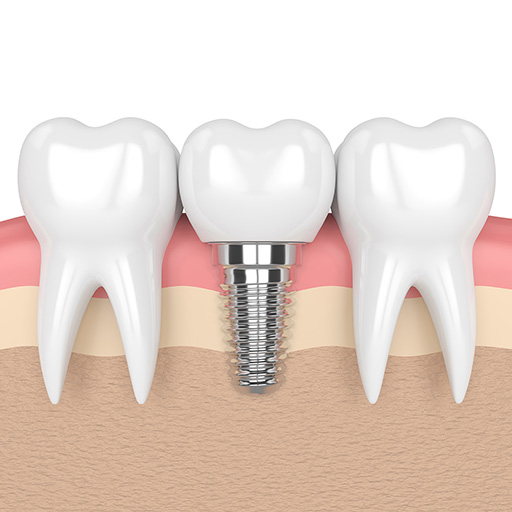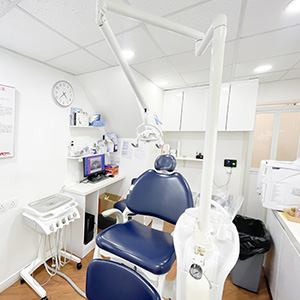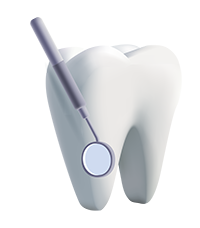
Dental Implants
Dental implants are widely recognized as durable dental prostheses that replace the root of a tooth. Dentists surgically implant titanium alloy implants into the jawbone to replace missing tooth roots. Titanium alloy implants can fuse with the human bone without causing rejection reactions. Once the fusion is complete, dental implants can serve as the foundation for dental crowns, bridges, or removable dentures. The advantages of dental implants include providing a stable and natural-looking replacement for missing teeth, increased self-confidence, better nutrition, and improved facial appearance.
Treatment Procedure
I. General Dental Implant Procedure
- In order to gain a comprehensive understanding of the state and shape of your jawbone and teeth, your dentist will first do a cone beam computed tomography (CBCT) 3D scan to assess the morphology of your teeth, soft tissues, nerve routes, and bone tissues.
- The dentist will proceed with local anesthesia, intravenous sedation, or general anesthesia (the anesthesia method will be determined by the dentist).
- The dentist will use dental tools to incise the gums, drill holes in the predetermined position and angle, insert the implant, and then suture the gums.
- The dentist will attach the denture, crown, or bridge to the implant once the jawbone has healed and integrated with it, cohesive structure, which should take three to six months.
- Once the implant site has healed and the bone has fused with the implant, a permanent dental crown will be fabricated and placed.
II. Immediate Implant Placement Procedure
- The surgery involves implanting the dental implant during the same tooth extraction procedure, eliminating the need for another gum surgery.
- Patients do not have to undergo two separate surgeries, and there is no need to wait for three to six months during the treatment period. The implant is placed immediately after the tooth extraction.
Q&A
- When Is A Dental Implant Needed?
- What Are The Advantages Of Dental Implants?
- Can I Get Dental Implants? What Are The Limitations Of Dental Implants?
- Is The Success Rate Of Dental Implant Treatment High?
- What Are The Differences Between Immediate Implant Placement And Traditional Dental Implantation? Can I Undergo Immediate Implant Placement Surgery?
- Will Dental Implantation Be Painful?
- What Are The Disadvantages Of Dental Implants?
- Why Is Dental Implantation So Expensive?
- Feeling Strange After Dental Implantation?
- What Are The Precautions After Dental Implantation?
Severe tooth decay or dental trauma can lead to tooth loss in the mouth. Tooth loss not only affects appearance but can also cause adjacent teeth to shift, affecting bite, pronunciation, and chewing function. In the most severe cases, it may lead to bone resorption, worsening of periodontal disease, and even facial deformity, seriously affecting the patient’s appearance.
Dental implant is a fixed denture used to fill the gap left by missing teeth in the mouth. Dentists will implant metal materials into the jawbone and then install artificial dental crowns, bridges, or embedded dentures to replace the missing teeth. Dental implants help restore the appearance and function of the patient’s teeth.
The purpose of dental implants is to fill the missing teeth, improving the appearance and function of the patient’s teeth. Dental implants are anchored in your jaw bone just like natural teeth. Over time they will help preserve the jaw bone and significantly reduce bone resorption.
Patients with severe bone loss in the jaw don’t have enough bone for traditional implants to remain securely embedded. Fortunately, there are still techniques available that make implants possible, even with a lack of bone in the jaw. An option such as the use of guided bone regeneration surgery or sinus lift surgery, but it requires a longer recovery period and regular monitoring of the increase in bone volume.
The overall health condition of the body is also a factor that affects the success rate of dental implants. The following are individuals at higher risk for dental implants, and further assessment is needed before considering dental implants:
- Wound healing issues
Patients with diabetes are more prone to have inflammation than the general population, as there may be higher levels of sugar and bacteria in the oral cavity. - Taking anticoagulant medications (blood thinners)
Since dental implantation is a surgical procedure that may involve bleeding, taking blood thinners can potentially lead to prolonged bleeding. - Periodontal disease
Periodontal disease is a chronic inflammatory condition that results in damage and loss of tissues around the teeth (such as gums, jawbone, etc.). Dental implants require sufficient healthy jawbone to support the artificial tooth roots. If a patient has poor periodontal health, the supporting structures of the teeth may not provide adequate support, affecting the success rate and long-term stability of dental implants. - Taking medications related to osteoporosis
As dental implants rely on the jawbone to support the tooth roots, taking medications related to osteoporosis may slow down a patient’s bone metabolism, leading to inadequate bone formation. - Smokers
Smoking can cause jawbone resorption, significantly reducing the success rate of dental implants.
The success of dental implant treatment depends on several factors, including the location of the missing tooth.
Since dental implant treatment involves penetrating the jawbone, some individuals may not be suitable for dental implant treatment due to factors such as inadequate jawbone, smoking, or diabetes. The dentist will make a full assessment of your mouth to check the health of your remaining teeth and ensure that surrounding dentition will not interfere with the placement of your new implant.
There are several main differences between immediate implant placement and traditional dental implantation:
- Surgical procedure: Immediate implant placement involves implanting an artificial implant immediately after removing a damaged tooth, without waiting for jawbone integration, resulting in a shorter surgery time. Traditional dental implantation typically requires a period of jawbone integration (usually several months) before the artificial implant is firmly integrated with the surrounding bone.
- Wound size: In immediate implant placement surgery, the wound is smaller because it does not require extensive flap surgery or gum incisions for implantation. In contrast, traditional dental implantation may require larger gum tissue incisions for implanting the artificial tooth root.
- Suitability criteria: Immediate implant placement requires patients to have higher jawbone integrity, and patients with severe bone loss may not be suitable for this method. Traditional dental implantation is more suitable for cases with poorer bone quality or requiring additional bone reconstruction.
- Overall treatment time: Since immediate implant placement skips the jawbone integration period, the overall treatment time may be shorter. Conversely, traditional dental implantation requires waiting for jawbone integration before placing the dental crown, which may result in a longer overall treatment time.
Immediate implant placement is generally a rapid and efficient dental implant procedure that is appropriate for qualifying patients. Nonetheless, it is important for patients to consult their dentist attentively, evaluate their specific circumstances, and carefully assess the benefits and drawbacks of each method in order to determine the most suitable approach for their individual situation.
The dental implant procedure does not cause pain as it is typically performed under general anesthesia or local anesthesia, numbing the mouth completely. After the dental implantation surgery, patients may sometimes experience mild discomfort when the anesthesia wears off.
One of the drawbacks of dental implants is their high treatment costs, which certain insurance companies may not be able to pay for. Other drawbacks include gum swelling, bleeding, and discomfort during the surgical procedure. During the procedure, complications including nausea, vomiting, and anesthesia-induced drowsiness are possible, but they are uncommon.
There are many reasons why dental implants can be costly, and here are some factors that may affect the pricing of dental implantation:
- Quality of Materials
The cost can be affected by the implant’s material quality, processing precision, and amount of clinical research.careful consideration is necessary because variations in quality between different brands or materials might not be noticeable straight away and might not become obvious until the patient has used them for a significant amount of time. - Additional Surgeries
Patients may require additional surgeries to ensure that the condition of the jawbone and gums is suitable for dental implantation: The jawbone may gradually degrade after a tooth is lost, and in order to support the artificial tooth root after implant implantation, there must be enough height and width in the jawbone. If not, a bone augmentation procedure may be needed to increase bone volume and support, hence extending the dental implant’s lifespan. A sinus lift procedure might be required if the implantation location is impacted by the upper jaw sinus. - Complex Cases
Specialized dentists are skilled in addressing more complex oral and jawbone issues, conducting risk assessments, and performing surgical treatments.
In summary, dental implantation is a treatment method to restore chewing function and improve oral health. It is advisable to consider factors beyond price, such as individual needs, comfort, convenience, and affordability when deciding whether to choose dental implantation to fill the gap left by missing teeth. Generally, doctors typically provide patients with multiple treatment options to consider, as in most cases, there is not a single treatment that is necessary for the patient. Ultimately, patients have the right to weigh the pros and cons based on their actual circumstances and needs and decide which treatment option to accept.
Since dental implants are designed to replace missing teeth and do not have nerves like natural teeth, you may feel some sensations around the gum tissue of the implant, but you won’t have any sensation specifically related to the implant itself.
- Be sure to maintain good oral hygiene, properly clean both natural teeth and implants daily to avoid gum infections around the implant area or periodontal disease.
- Patients should schedule regular appointments with a dentist for follow-up checks.
- Avoid chewing hard foods such as animal bones to prevent damage to the implants.
- Quit smoking to prevent periodontal disease and reduce adverse effects on implants.
- Maintain good oral and dental hygiene, recommended to have a dental cleaning every four to six months to ensure the gum health around the implants.
The success of the surgery does not solely depend on the doctor performing the surgery, but also on the patient’s correct use and maintenance after the surgery to ensure that the treatment brings convenience to your life.










